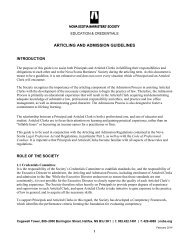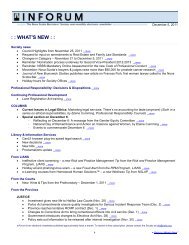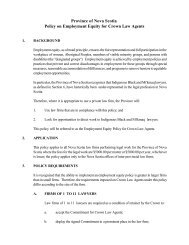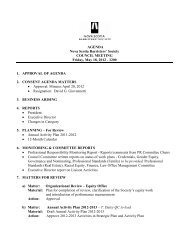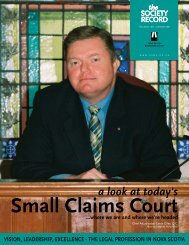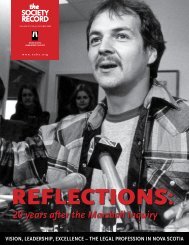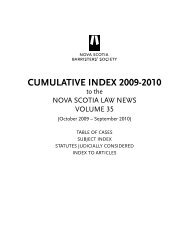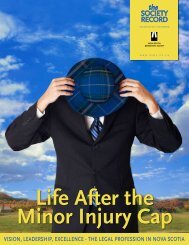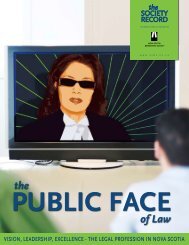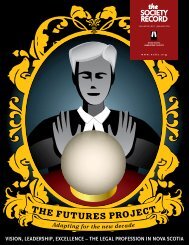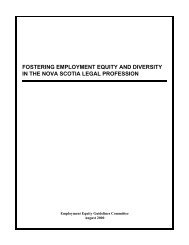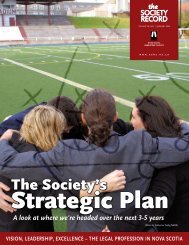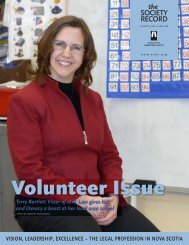SR Vol 27 No 3, July 2009 - Nova Scotia Barristers' Society
SR Vol 27 No 3, July 2009 - Nova Scotia Barristers' Society
SR Vol 27 No 3, July 2009 - Nova Scotia Barristers' Society
Create successful ePaper yourself
Turn your PDF publications into a flip-book with our unique Google optimized e-Paper software.
BRIEFS<br />
New <strong>Society</strong> Leadership<br />
On June 20, the <strong>No</strong>va <strong>Scotia</strong> Barristers’<br />
<strong>Society</strong> welcomed its new Council,<br />
which is now helmed by President J.<br />
Ronald Creighton QC (centre) of Tatamagouche.<br />
Joining him as officers are new<br />
First Vice-President Marjorie A. Hickey<br />
QC and Second Vice-President Daniel M.<br />
Campbell QC, both of Halifax.<br />
First winning Race and the Law essay reveals lessons from history<br />
Dalhousie Law student inspired by a poem<br />
David Steeves was a first-year law student at<br />
Dalhousie University when he stumbled upon details about<br />
an unsettling Halifax murder case that would later inspire his<br />
academic research.<br />
The poem “1933,” in George Elliott Clarke’s book Execution<br />
Poems, mentions Daniel Sampson, an African-<strong>No</strong>va <strong>Scotia</strong>n<br />
veteran of the Great War. Sampson had been arrested and tried<br />
in the mysterious 1933 deaths of two young brothers whose<br />
bodies were found near railway tracks on the outskirts of Halifax.<br />
The coroner’s inquest was inconclusive, and some believed<br />
Edward and Bramwell Heffernan could have died in a tragic<br />
misadventure with a passing train. Even so, Sampson faced two<br />
sets of trials and appeals in <strong>No</strong>va <strong>Scotia</strong>, in a notorious case that<br />
went to the Supreme Court of Canada.<br />
“It wasn’t until several years after reading the poem that I really<br />
became interested in the case,” says Steeves, recipient of the<br />
inaugural Race and the Law Essay Prize, awarded in June by the<br />
Race Relations Committee of the <strong>No</strong>va <strong>Scotia</strong> Barristers’ <strong>Society</strong><br />
and sponsored by the law firm Stewart McKelvey.<br />
By then into his graduate studies, he had arranged for Dr. Clarke<br />
– who earned the Governor General’s Literary Award for his<br />
poetry book – to visit the<br />
law school and read from<br />
his new novel. Logistically,<br />
the only way the event<br />
would work was if Steeves<br />
drove to Mount Allison<br />
University to pick up the<br />
author, a visiting scholar<br />
there at the time, and drive<br />
him back again that night.<br />
“Shortly after leaving<br />
Sackville, we started<br />
discussing the Sampson<br />
case and came back to it<br />
several times on both the<br />
David Steeves<br />
drive down and the drive<br />
back,” Steeves recalls. “The next day I looked up the trial and<br />
appellate decisions and came upon a comment by Sampson’s<br />
lawyer that turned my attention to not only jury selection in this<br />
case but in <strong>No</strong>va <strong>Scotia</strong> generally at the time. Once I started<br />
going through the archival material as well as the relevant<br />
legislation, I knew this was a really interesting case that might<br />
have something more important to say.”<br />
10 The <strong>Society</strong> Record



